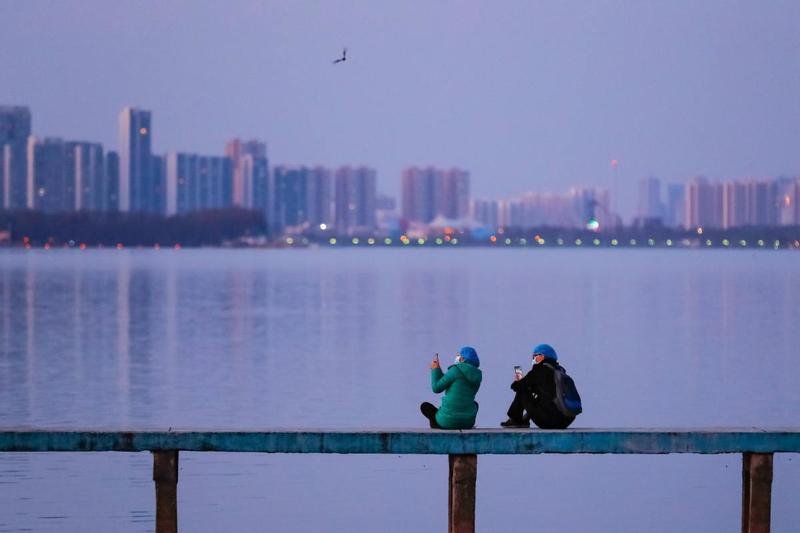 People watch the sunset on a fishing pier on East Lake in Wuhan, Hubei province, on March 18, 2020. (PHOTO / XINHUA)
People watch the sunset on a fishing pier on East Lake in Wuhan, Hubei province, on March 18, 2020. (PHOTO / XINHUA)
Hubei province and its capital, Wuhan, the hardest-hit city by the novel coronavirus epidemic in China, reported no new infections for the first time on Wednesday, as travel and movement restrictions in Wuhan and its surrounding areas were further eased, and nearly half of the region's industrial sector resumed production.
The clearing of new domestic infections in Wuhan, Hubei province, marks another major milestone in China's containment efforts after the rest of the country registered zero or very few new cases for several weeks and major cities have shifted their focus to battle an increase in imported infections.
The National Health Commission added 34 new cases on the Chinese mainland on Wednesday, all of them brought from overseas to regions including Beijing, Shanghai and Guangdong. The number of imported patients nationwide climbed to 189.
In the past week, imported cases have accounted for 84.55 percent of all new infections. The risk brought by the global spread of the virus has multiplied.
Mi Feng, Spokesman for the National Health Commission, China
In addition, eight new deaths, with six in Wuhan and two in other cities of Hubei, were registered on Wednesday. A total of 7,263 patients are now under treatment at hospitals, including 2,314 in severe condition.
ALSO READ: COVID-19: Wuhan reports no new infections for first time
The commission spokesman Mi Feng said on Thursday that China recorded no new domestic infections for the first time on Wednesday. In Hubei outside Wuhan, the situation has been maintained for 14 consecutive days, and the rest of the mainland outside Hubei has added no local cases for seven days in a row.
"In the past week, imported cases have accounted for 84.55 percent of all new infections. The risk brought by the global spread of the virus has multiplied," he said.
While hailing the progress, health experts also warned that zero new cases do not justify an overall relaxation, as the risk of transmission is not stamped out and much still remains unknown about the virus.
Li Lanjuan, a senior adviser to the commission, said close attention should be paid to monitoring communities and fever clinics, reported Changjiang Daily, a Hubei-based newspaper.
She called for standardized procedures at fever clinics, including conducting seasonal flu and novel coronavirus tests on all feverish patients. The entire nation should also stay alert to imported cases and a possible second wave of the outbreak.
Jiang Rongmeng, an infectious disease expert at Beijing Ditan Hospital, said that the battle against the disease has not ended. The epidemic situation remains volatile due to a lack of understanding of its transmission mode and the risk of patients that are asymptomatic or exhibit only minor symptoms.
Nevertheless, life has begun to return to normal in gradual and slow steps in Hubei, with residents venturing outside, migrant workers returning to workplaces, and key factories up and running.
In Wuhan, residents in communities designated as "infection-free", are allowed to engage in personal activities inside the compound by turn after more than a month of being largely confined at home. Group and cross-household visits are still prohibited, the city's disease prevention and control task force said in a guideline released on Wednesday.
Rural villages labeled as free of the virus in Wuhan can resume normal activities and agricultural production. Transport of agricultural materials should be smoothed out and related stores can reopen, according to the guideline that took effect immediately.
READ MORE: Mainland reports zero new local COVID-19 cases
The new rules are expected to benefit at least 78 percent of residential compounds and nearly 95 percent of rural villages in Wuhan, which were labeled as free of infections by the task force as of Tuesday.
Most city-level areas in Hubei province except for Wuhan have already relaxed movement controls due to the slowing spread of the virus. Authorities have utilized staggered schedules, color codes that record residents' health status, and entrance passes, to control the flow.
The resumption of production has also sped up in Hubei, with 7,629 enterprises in its industrial sector in operation. The work resumption rate reached 49.3 percent as of Tuesday, Wang Qiyang, head of the provincial government's economy and information technology department, said on Wednesday.
Cao Guangjing, vice-governor of Hubei, said companies and factories that have significant impact on the national, even global, supply chain, will be given the priority to work at full capacity.
For instance, Hubei, as an industrial powerhouse, manufactures about one-third of the country's phosphate fertilizer. As the spring planting is approaching, it is vital to ensure that fertilizer factories resume work.


